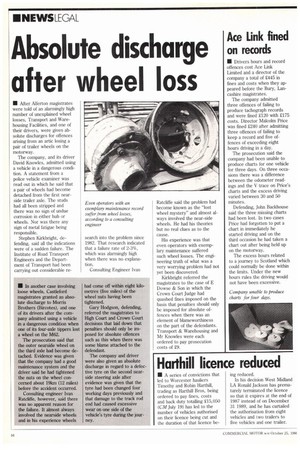Absolute discharge after wheel loss
Page 18

If you've noticed an error in this article please click here to report it so we can fix it.
• After Alferton magistrates were told of an alarmingly high number of unexplained wheel losses, Transport and Warehousing Facilities, and one of their drivers, were given absolute discharges for offences arising from an artic losing a pair of trailer wheels on the motorway.
The company, and its driver David Knowles, admitted using a vehicle in a dangerous condition. A statement from a police vehicle examiner was read out in which he said that a pair of wheels had become detached from the first nearside trailer axle. The studs had all been stripped and there was no sign of undue corrosion in either hub or wheels. Nor was there any sign of metal fatigue being responsible.
Stephen Kirkbright, defending, said all the indications were of a sudden failure. The Institute of Road Transport Engineers and the Department of Transport had been carrying out considerable re search into the problem since 1982. That research indicated that a failure rate of 2-3%, which was alarmingly high when there was no explanation.
Consulting Engineer Ivan Ratcliffe said the problem had become known as the "lost wheel mystery" and almost always involved the near-side wheels. He had his theories but no real clues as to the cause.
His experience was that even operators with exemplary maintenance suffered such wheel losses. The engineering truth of what was a very worrying problem had not yet been discovered.
Kirkbright referred the magistrates to the case of E Dowse & Son in which the Crown Court Judge had quashed fines imposed on the basis that penalties should only be imposed for absolute offences when there was an element of blameworthiness on the part of the defendants. Transport & Warehousing and Mr Knowles were each ordered to pay prosecution costs of £9,




































































































































